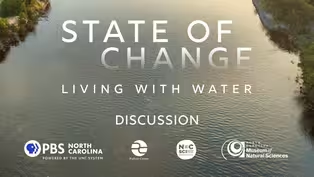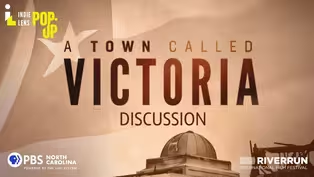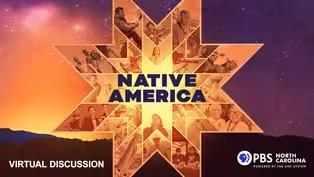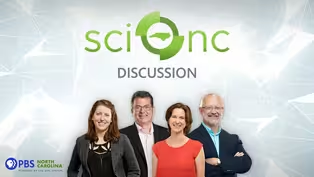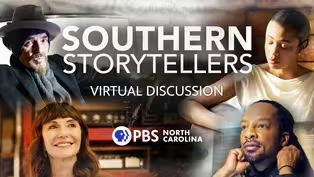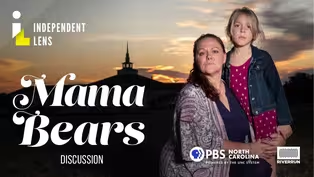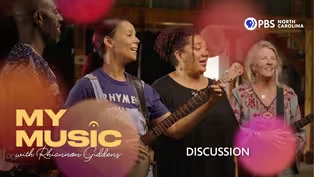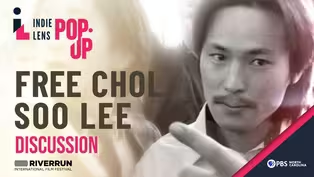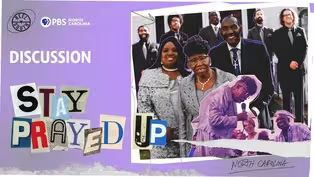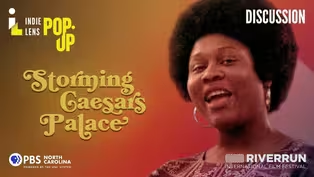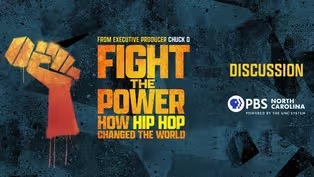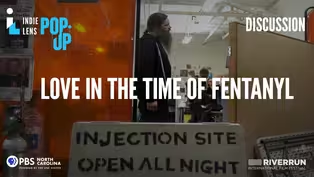PBS North Carolina Specials
Discussion | Show Must Go On!
9/15/2022 | 37m 31sVideo has Closed Captions
The filmmaker & members of "Hot Stuff" share their talent and love of spreading laughter.
Heather Burgiss, director of original productions and senior producer & host of "My Home, NC," leads a conversation with filmmaker Jeremiah R. Jones and the ladies of "Hot Stuff" on their preparations for their final variety show at their retirement community in Chapel Hill, North Carolina. Pat Beyle, Karen Cooper, Jane Hauser and Mary Crabill make us laugh and spread joy.
Problems playing video? | Closed Captioning Feedback
Problems playing video? | Closed Captioning Feedback
PBS North Carolina Specials is a local public television program presented by PBS NC
PBS North Carolina Specials
Discussion | Show Must Go On!
9/15/2022 | 37m 31sVideo has Closed Captions
Heather Burgiss, director of original productions and senior producer & host of "My Home, NC," leads a conversation with filmmaker Jeremiah R. Jones and the ladies of "Hot Stuff" on their preparations for their final variety show at their retirement community in Chapel Hill, North Carolina. Pat Beyle, Karen Cooper, Jane Hauser and Mary Crabill make us laugh and spread joy.
Problems playing video? | Closed Captioning Feedback
How to Watch PBS North Carolina Specials
PBS North Carolina Specials is available to stream on pbs.org and the free PBS App, available on iPhone, Apple TV, Android TV, Android smartphones, Amazon Fire TV, Amazon Fire Tablet, Roku, Samsung Smart TV, and Vizio.
Providing Support for PBS.org
Learn Moreabout PBS online sponsorshipMore from This Collection
Recordings of previous virtual event discussions.
Discussion - State of Change: Living with Water
Video has Closed Captions
Panelists discuss resilient North Carolinians adapting to climate change. (28m 54s)
Discussion - A Town Called Victoria - Independent Lens
Video has Closed Captions
The filmmaker and former Victoria residents share their story. (46m 51s)
Discussion - Native America Season 2
Video has Closed Captions
Panelists discuss preserving the languages of Native American tribes. (39m 1s)
Video has Closed Captions
Sci NC executive producer and host, Frank Graff, chats about upcoming Season 6 of Sci NC. (26m 6s)
Discussion - Southern Storytellers
Video has Closed Captions
Author David Joy and others discuss storytelling and their new PBS series. (42m 13s)
Discussion - Mama Bears | Independent Lens
Video has Closed Captions
Producer and director Daresha Kyi discusses the film and LGBTQIA+ advocacy. (34m 41s)
Discussion - My Music with Rhiannon Giddens
Video has Closed Captions
Discussing the series with producers Will & Deni McIntyre and country artist Rissi Palmer. (39m 56s)
Discussion - Free Chol Soo Lee | Independent Lens
Video has Closed Captions
Local lawyers, professors and nonprofit leaders discuss wrongful convictions and reentry. (40m 44s)
Discussion - Stay Prayed Up, Reel South
Video has Closed Captions
The filmmakers discuss their journey with Mother Perry and The Branchettes. (45m 4s)
Discussion - Storming Caesars Palace | Independent Lens
Video has Closed Captions
Local professors and nonprofit leaders discuss welfare and the social safety net. (33m 2s)
Discussion - Fight the Power: How Hip Hop Changed the World
Video has Closed Captions
Local experts discuss the history of hip hop with PBS North Carolina. (59m 43s)
Discussion - Love in the Time of Fentanyl | Independent Lens
Video has Closed Captions
Local harm reductionists, therapists and others discuss the opioid crisis and more. (55m 44s)
Providing Support for PBS.org
Learn Moreabout PBS online sponsorship- Good evening and welcome.
I'm Heather Burgiss, director of Original Productions at PBS North Carolina.
Thank you for joining us for this special evening, and I hope you enjoyed the preview screening of this uplifting and inspirational film, Show Must Go On!
And speaking of inspirational and laugh-out-loud funny, I have here with me tonight, and you will soon have the pleasure of meeting four very talented and inspirational women and the one who made it all possible, bringing it to you and to PBS, the filmmaker.
And let's welcome them.
Joining us is Pat Beyle, hello Pat.
- [Pat] Hi.
- Karen Cooper, Mary Crabill.
- Hi!
- Jane Hauser.
- Hi.
- And filmmaker, Jeremiah Jones.
Welcome to you all.
Thanks for joining us so much.
- Thank you, thank you.
It's great to be here.
- Jeremiah, I'm gonna start with you.
And our audience might not know this, but you and Pat, Pat is your mother-in-law.
How did the film come to fruition?
Tell us a little bit about that.
- So I've always been just captivated by Pat's stories and the conversations that we've had over the years.
And I've known Pat to kind of take on different passions just from those stories.
But even in the years that I've known her, I mean, I've known her as an athlete, I've gone to her triathlons.
I've known her as a chef.
I've known her as a musician.
And so she was doing this show, Hot Stuff, with her friends for, I think, three years, and I had never seen it.
And then I found out that she was doing the final show.
And so I said to my wife, I said, well, we should go and film it, if anything, just for posterity's sake.
And when I called Pat and told her that, she obliged and I called the other women and talked with them and come to find out, I thought, you know, there's more to it than just the show.
I think we actually could make a short film out of this.
So we kind of scrambled, we actually did a GoFundMe, and we raised funds in three weeks to have crew, to be able to film and do interviews and everything else.
And so I knew there was a story there.
I just didn't know what the story was until we got down there.
- And you found lots of surprises, I know, because we see that in the documentary, just kind of the ups and downs and all the fun.
And I have a question for Pat, Pat, a life well spent, you spent most of it teaching, but bringing your singing and the songwriting to this audience, what was it that gave you so much joy to be in this role and to be with these ladies?
- Well, first of all, our energy together is, it's ridiculously wonderful.
And so working with them was an inspiration.
But you know, all through your life, it's my thought, I'm in my fourth quarter and I just, I've been a teacher, I've been a musician, and you just pile all those things together in the fourth quarter.
And with this group, you just sort of sort it out and find out what's fun and go for it.
- And you all certainly did go for it.
It was so much fun to watch.
Now here's a question for Mary, who is joining us from Miami, you and your lovely friends are now movie stars.
What did you think when you were being approached by Jeremiah?
The filmmaker.
- Movie stars, oh, I love it!
- Movie stars.
Yes Mary, you are a movie star.
What did you think after learning that it wasn't just for the family, that it was gonna be something bigger.
What did you think?
- Well, I was kind of, you know, just taken aback.
I thought, what, is he crazy?
I mean, you know, we kind of all just got together because we wanted to put something on for the place we lived, the Cedars of Chapel Hill, and just to entertain the people there, make 'em smile a little bit, make 'em laugh a little bit, and kind of forget, like my sister has said before, their aches and pains, and so forth.
We didn't really think about being stars, but hey, we'll take it.
- I think you should take it.
You all are definitely stars.
And Karen, an accomplished pianist, when did you start playing the piano and what did it mean for you to be able to continue to play with Hot Stuff and for all your friends and fellow residents at the Cedars?
- I started playing probably about age five and so did that, but got to high school age and I was into all kinds of things, so piano kind of went by the wayside, other than accompanying for the choral groups.
And that was always fun.
And I always enjoyed the accompanying part, kind of being in the background.
And so all through college, I got a degree in music ed and then would find myself accompanying for various groups and such whenever, after we'd gotten married and moved around a bunch.
Then when I moved to Chapel Hill, there was a voice teacher in town that needed an accompanist for her studio.
So I joined that and did that for many, many years.
And then this crazy group decided that they needed a piano.
And I thought, well, okay, I can quietly sit in the background and be the accompanist, which is what I like.
And no, that was not to be, so next thing you knew they had me out on stage and I'm not quite sure that's my forte, but... - Oh, I love it.
I love peer pressure, I love that.
And now a question for Jane.
Joke-writing, performing, singing, your talents are limitless.
And just on the call before, when we were practicing, you had me in stitches.
How many shows did you co-create and perform in?
- You mean with Hot Stuff?
- Well, any stuff, yeah.
- Well with Hot Stuff, we did four.
- Okay, all right.
- Four different ones.
But I first started, oh gosh.
I guess Mary and I used to sit, we're sisters, and I'm seven years older, but we used to, hi honey.
We used to sit in the back seat of our parents' car, and harmonize with each other on long car trips.
Our dad was a football coach.
And so his idea of going on vacation in the summer was to go look at stadiums.
So we were driving between this stadium and then down the road, another university, and that stadium and we stand there.
So Mary and I kind of made up our own fun and it started back then.
And I did it, you know, through school, and finally wound up here and did a Mickey Rooney turn of, hey gang, let's put on a show.
- I love it, I love it.
Jeremiah, what did you learn about yourself while hanging out with these lovely ladies?
Can you describe some of the shenanigans that went on while filming?
Were you surprised by anything?
- I mean, many things, but I would say, well, one thing I learned about myself is that I'm looking forward to maybe living in a community like theirs one day.
I got very comfortable in my few weeks stay.
- You didn't wanna leave, right?
- No, I didn't, in fact... - Jer, tell 'em about when you had to go home.
- Yeah, we had some re-entry issues, you know, I couldn't just order from the club.
I couldn't, you know?
Yeah.
But yeah, the routine there was great.
but I think, one of the biggest surprise, I shouldn't say I was surprised, but one of the things I really got out of the entire experience were the friendships.
I wasn't expecting necessarily to have anything in common with these ladies.
I mean, I knew Pat.
And so we had a great relationship already, but I think the most surprising things were discovering things in Jane's story and Mary's story, and even Karen's that I could relate to so easily.
Karen as a musician.
I love music.
And so just sitting and talking with her and hearing about just her life and music and her record collection.
Well, actually it was her sister's record collection, I believe, but things like that.
And then with Mary, just hearing about her family, and what was really kind of motivating her to move out of that community, and move down to Florida and be near family.
It meant a lot to me.
And Jane's story really resonated with me, especially when she said that she read a book called I Married Adventure as a teenager.
And so she was telling me all these wonderful stories that her and her husband had together.
And I could really relate to that, 'cause I grew up watching things like Jacques Cousteau, so I grew up wanting adventure in life as well.
But the inspiration I took from the filming of this was really that the show does go on.
And in fact, it must, and it's never too late to reinvent yourself.
It's never too late to continue pursuing those things that you're passionate about.
And that's something that was really encouraging to me, because there's a lot of things that I'm passionate about.
And I think that I'm not the only one, I know that our cinematographer, Chris Davis, there were several moments during interviews, where I could see him, I won't say he got emotional, but I could see him being impacted by what was being shared.
And he and I have had multiple conversations during filming about as we get older, what do we see us doing with our lives?
And so it really raised questions and great conversation throughout that process.
So I think those are some of the biggest kind of, personal takeaways for me.
- Thank you.
And I know, talking about Mary, 'cause there really is an arc about Mary's decision to move down to Miami, and Mary living and performing with these gals from Hot Stuff.
How difficult was that transition?
Do you keep in, how do you keep in touch with everybody?
- Well, I'm not very good at that, but I keep in touch with my sister, of course.
And the rest of you all are always in my prayers every day, but Miami was the place that my husband and I reared our three sons.
So it wasn't just, oh gosh, I think I'll move to Miami.
I had a home there, and two of my three sons lived in the area and my two granddaughters, the only grandchildren I have lived three blocks away.
And so I thought, well, I cannot justify spending all this money here at the Cedars when I have a perfectly good place to live in, in Miami, okay?
So I moved back and got to see, unfortunately right when COVID came.
But now my oldest granddaughter's back in Chapel Hill, in college.
So I probably should have stayed there, but... - You can come visit for sure.
- Oh yeah.
And I do, but, I loved Chapel Hill.
Well, I lived there with my sister and my mom and dad when he was an assistant coach at the University of North Carolina, when I was an elementary school and junior high, and my sister was in college.
- There was no, I didn't feel any emphasis there whatsoever.
- No.
I still had friends there that I would get together.
- Oh wow, from elementary school.
- Oh yeah.
Still live in Chapel Hill and we'd get together.
And I miss them, but I miss these gals a lot.
I don't have any... - I felt like it was a mini reunion before this, when you guys were touching up with each other and you can tell there's a lot of love and friendship between all of you.
- Oh yeah, we really enjoy each other.
And I don't have that here in Miami, which I do miss a lot, but it's just another plateau in life.
And my show must go on too, just as their show will go on.
Maybe just in a different way.
- Thank you, Mary.
Pat, any chance you will revive Hot Stuff, another version, or reinvent yourselves again and continue to perform?
- I'm sorry.
We dared Mary to come up here and take seven weeks and do it.
But, you know, I think we'd love to, but our show has gone on.
Jane has done some poetry and she can talk about that, but I'm involved in several other things.
And so, we've just kind of evolved, a way.
I love to perform.
So that said, anything that tempts me to do that, but we've developed other interests and we've passionately gone after them.
And so doing another Hot Stuff, well, maybe.
The hilarity of it would be absolutely wonderful.
- Something that you said earlier too, that I thought was really special was, when we see the faces of the audience and how much joy, and you talked about just keeping, the show must go on, keep going and keep moving.
And how really important that is in everyone's life.
- Performing is one thing and you look at the audience's faces, but you also, you perform with each other.
So there's two units in my thought.
If you are a unit on stage and you are working together and then you look out and you see the impact that you have on other people.
But it's two levels because it was us first and we had to get together and we had to perform for and with each other.
And that's thrilling, I'm getting goosebumps.
- Jane, did you feel that way as well?
- Of course.
- Did you feel like that?
- I'm a professional storyteller, and I did that after my husband died 17 years ago.
I talk about reinventing yourself.
I knew I had to do something, I was only 70 at the time.
And I had gone up to Jonesborough, Tennessee, to the National Storytelling Festival.
And I thought, and Chuck actually knew I could do this too.
He had listed all my stories that he'd heard me tell over the dinner table.
So I stood up in front of a group one time and told a story and then the neck took off.
So I, like anybody who goes on stage and tells a story or performs, feeds on the audience reaction.
I mean, that's kind of lifeblood to us, and we can see that.
So we saw that in Hot Stuff.
And the exciting thing was that these were our friends.
- That's wonderful.
- So it made it doubly special.
- And Karen, I love that she sort of, got to be funny and on the spot when required, even spontaneous.
How did you enjoy that experience or learn to enjoy that experience?
- Well, I thoroughly enjoyed it.
There's a little bit of ham in me, so I enjoy that.
- A little?
- They had thrown a chicken at me, rubber chicken, and I had nothing to do but to take that and go with it.
So then I found I kind of enjoyed that as well, but then I had to run back to the piano and actually, being an accompanist is kind of nice because if they haven't been very nice to me the day before, so I can make them sound really, really bad.
- Oh wow.
- And they... No, I wouldn't do that.
- She is the glue though, she is the glue... - Maybe for you Mary, but not for anybody else.
- That's funny.
Well, we do have some, I'm sorry, Jane, I'm sorry, go ahead, Pat.
- Well, I said, if we screw up, she covers for us too.
- She does that, yeah.
Well, we have some audience questions, and I would love to share some of them and get your opinions.
Just a few.
Jane, what is your favorite topic to write about?
- Oh, I don't know that I have a favorite topic.
It just, the stories that I've told, I've told about everything from a yard sale to when I was young and my husband was a reporter and we went and covered a Ku Klux Klan meeting.
So it kind of, it's the gamut.
Mostly my experiences.
Story is, usually for me, based on something true, but it's tweaked and that's what makes it story.
It meets in the middle.
- Thank you.
And here is another question.
And I'll throw it out to anyone.
What would you say to today's schools about the importance of performing arts education and how the education makes a difference throughout life?
- Oh, we don't have enough time to answer that.
I was a choral music director, - It's a good question.
Teacher, at the high school, and you just, through music, through performing, these kids evolved, they grew up, they matured, they had experiences and you just, they won confidence.
I learned to support my own program and I had to do that many, many times, but without the cultural arts, we just, that side of us is just dry, just gone.
- Well, I taught drama in junior high and high school.
And if you wanna see a real change in a teenager, put 'em on the stage.
They gain a confidence, they gain a respect for themselves and other people, which in this day and age, they work as the team.
It is so important for them to know how to respect one another and what they do.
And I really loved teaching drama.
That was something I really loved doing.
- Well, and here is another question, and it's really interesting.
It's asking, did you ladies feel invisible and did performing bring joy to your own life and made you feel seen and heard?
Did you once feel invisible, that the show made you feel seen and heard?
Or maybe that, that is the question.
- I never felt invisible.
- I can't see any of you feeling that way.
- I didn't let anyone think I was invisible.
- Invisible is not a word.
- Or unheard.
- I never felt invisible and it gave me permission, maybe I'll put it that way.
It gave me permission to be a little wilder.
- We certainly push the wild button, we did push the wild button.
- I love that.
Well, Jeremiah, with, when we're looking at, what are you hopeful for that people glean from the documentary?
What are you hoping people take away?
- One thing would be just the role that stories play in our lives.
And not only just the stories we tell, but choosing to sit and listen to other people's stories.
It's so important that, I think that, as a storyteller myself, I feel that stories are really what connect us through kind of our shared human experience.
And that's what I experienced in making this film, taking the time to get to know these other three ladies and learning their stories, I learned things about myself as well, and I found inspiration in their stories, and from their life.
And so really sitting down and getting to know people cross-generationally as well, I think is really important.
The other thing would be go out and try something.
I love Mary's line where she says, go out and try something.
What's the worst that's gonna happen?
Are you afraid you may fail?
You may not succeed?
Is that the measuring stick that you're going to use to decide whether or not you try something?
And I think we all do fear a little bit of failure, but without that risk, there's no reward.
And we can't discover what we are really capable of and what we can truly experience and glean out of life.
So I hope that, walking out of a theater or stepping away from the screen, watching this, inspires people to say, you know what, I've always thought about community theater, or I always thought about writing, or I have that story I always wanted to put down, or I wanted to take up gardening, or cook, whatever it is.
No time like the present.
- Yeah.
- Amen.
- Well, I have a great question.
I'm gonna send it to all of you 'cause it's a really good one.
What was your favorite comment you ever received from an audience member?
Who wants to start?
- I'll start with that.
I had a 94 year old friend who saw the performance of Hot Stuff and she, the next day, she said to me, I laughed so much and had such a good time at your performance, that for the first time in 10 years, I slept through the night and didn't have to get up once.
- That's the highest compliment.
- Call it a service we have.
- All of us here can relate to that.
- It's your service, yeah.
- We're service already.
- It really thrilled me to know that, that we could take people out of their, whatever it was that was troubling them, whatever it was that was hurting them physically, and put them in a different happy place.
- I love that.
Anyone else?
Favorite audience comment?
- I was really excited because I had my granddaughters come in and watch.
And they were just enthralled with it.
And so JR was just talking about cross-generational, but to have your grandchildren sort of connect with you on stage.
I mean, they were just so excited after the show, and that really meant a great deal to me.
Just, I knew my friends were happy.
It was joyful, it was wonderful.
But to make an impact on my granddaughters was amazing to me.
Just wonderful.
- What was it like when you all were singing Hello, Dolly, walking in and seeing the faces.
What was that like to see the expression of that audience?
And again, I've mentioned, that's one of my favorite parts where we see the joy and some surprise.
So what was it like to see that as you were walking and singing that song?
- Well, they're friends to begin with, and actually we sang Hello, Cedars, not Dolly.
We were speaking to all our friends that were there from the Cedars.
And you just kind of felt like you were walking into a room and people were there, 'cause they were glad to see you and you were glad to see them and you were welcoming them, hoping that they could take away something that would make their evening more pleasurable.
I really enjoyed that too.
- Our costume sort of made us feeL, with that big hat, it was kind of like floating at first, because you, hello, and your arms are out, and you're kind of sashaying down the aisle, and they're turning around to look because, we didn't just come on stage.
We floated down the aisle and it was fun.
- Well, you may have floated.
I kinda stumbled.
- Well then, there were some people on the aisle in peril, but it's alright.
- Well I've seen Hello, Dolly on the stage and it transported me.
I actually felt like, with my feather boa and everything, I kind of felt like, yeah, I was in a play.
It was great.
- I think what I really noticed being at the shows was, like you said, these are friends and so, watching the audience members react to you all, it really felt like they were kind of part of the show as well.
I mean, they were so invested in it.
They so wanted you to do well that they're like, it's almost like the pressure was off.
But then you would still surprise 'em and I think the biggest reaction I remember seeing is when you guys came out and did your rap, and I tried so hard to put more of it in the film, but I think what was so great about it is they do this rap and they actually rap almost about another neighboring community.
- That's right.
- In the end, they tell em to stay outta their hood.
- We were tough.
- And the people just fell out, 'cause it was great.
And so I think... - Ladies, are you ready?
One, two, three.
To the gang at the meadows, stay out of our hood.
- That is threatening.
- I had the biggest urge tonight to come out here in a wig with the pink stripe and the blue stripe and the green stripe and black nails and black lipstick, a goth.
I wanted to come goth and say, yeah, so?
- I love that.
- Annie's getting to you, girl.
- Someone at your age, if you say the word goth, people think you're just slurring.
- We're just getting warmed up now.
- I know, I know.
I don't think our audience has any idea how much fun your creative sessions are.
They have no idea.
- Well, anyway, maybe we could do that as our next rappy type thing.
We could be gothy.
- We already are.
- I love it.
What are, as you all have kind of expressed on our pre-call before this, that you want to get together.
Are we hopeful that if there is some type of reunion that creativity will come from that?
- It was already coming when we were talking before.
- I know, it's exciting.
- While they... We're already, we got the first number going.
- I think that you would have to define creativity.
- Okay.
- You need to define it loosely.
- Loosely.
- You know, I think one of the things too, you all just enjoy each other so much.
And I think that that comes across, all the personalities kind of perfectly mesh.
Did you feel that chemistry when you were working on this?
- Oh yeah.
I mean, there were times that my sister wanted to kill me, I know that, but that's okay.
- And nothing's changed, Mary.
- Well, that's true too.
- Karen and I are in the middle.
- That's right.
And they were like, go to your mutual corners, but I mean, yeah.
We do, we appreciate one another and we do, we appreciate each other's talents, so there you go.
- And we took turns being the director.
- I mean, as an outsider looking in, I think that when I was watching you guys rehearse and deciding kind of what to put in the show, and even at Jane's house practicing, I wouldn't say that it's like organized chaos, but I was amazed at how things just took shape and it's like, all of you kind of talk at once.
And then next thing I know you're in the middle of a bit.
And then you're talking about how to change that bit.
And then it, so it just flowed so seamlessly.
It was like they had their own kind of language and they knew what the other was gonna say as they were saying it.
And they were always on the same wavelength and that was really, really impressive to watch.
- What do you attribute that to, do you think?
What were you about to say, I'm sorry, Pat.
- No.
- No, it was me, the big mouth.
I was just gonna say, and I forget.
Oh, God.
No, I think we were, when JR said we were on the same wavelength, I think there is some truth to that.
We all knew why we were doing it and nobody was there to outshine anybody else.
We wanted to make it cohesive and just to be fun for us and for the audience.
- But it was chaotic.
I mean, if you come in from the outside, it was noise.
It was lots of noise, but it was constructive noise.
It was creative noise.
It was wonderful.
- I heard about, was it the beach trip?
The writing beach trip, was that part of the creativity process?
That sounded like a lot of fun.
- That was the first time.
And we all went and within an hour we were on the floor rolling with laughter.
That did it, we were off to a good start, because we just cracked each other up in the first hour.
- And then we went out and had seafood.
- And then we went to the place with the purple hats... - That's true.
- And then we all went out and bought sequin hats, do you remember?
- Yeah.
- Purple sequin hats.
- That's right.
- Actually JR, you probably would've gotten a really interesting documentary if you had just filmed that first writing session.
Now I don't know what kinda network would've bought it, but it was funny.
- Jeremiah, when you think of how this, how do you see this resonating across the country, as it is being offered to PBS stations across our system?
How are you hoping this resonates?
Or seeing this resonates.
- Well, we made this film during a really interesting time.
We finished wrapping at the end of 2019, beginning of 2020, or, no, end of 2019.
I think it was like October.
And so I edited this during the pandemic, and there was a really different narrative out there during the time about communities and retirement communities and older adults.
And so, I think what's really important about this film right now is it shows the resilience that we all have.
Where the narrative out there might be that these can be really negative places and they're hit really hard, and these are the frail people of our country right now.
What I see is something very different.
What I experienced there was very different from that narrative.
And so really coming back to your other question about comments from audience members, I actually heard a couple of comments, and the best one I heard was from a resident.
She said, walking out of this show, it reminds me that we get older, but we get better.
- That's great.
- And I think that's very true.
- Well, I think Show Must Go On is about reinventing yourself and it's about shining light on talents that maybe you kind of keep tucked in a little bit, but none of you do, you share your talents.
And I think that that's a wonderful thing.
Do you agree with that?
- I will say one thing that JR didn't mention, but when I first heard that he was working with this, and he plays little bits over and over and over and his eight year old sang to me, Alice in Wonderland.
I mean, they all knew that song because they heard it so many times.
Even the dog knew that, they all were, they all could practically say the whole documentary 'cause they heard it over and over and over again.
So it had reaches into the family.
- An editor's family gets to hear clips back and forth, back and forth, over and over, and they get to know the content very well, yes.
But I'm sure it was lovely for them to see their grandmother.
- Oh yeah.
- This is just really exciting.
It's just plain exciting.
I don't know how else to say it.
It's real, this is real, this is on network.
This is out there and people are, I hope people are enjoying it and getting the joy that we have.
- I think they are.
And we're almost out of time.
Thank you all.
Thank you so much to our lovely guests.
Lovely and funny.
You were so much fun, and thank you to our audience for logging in this evening and being a part of this special event.
Funding for the film was provided by the Aging Life Care Association.
And please tune in next Thursday, September 22nd, at 10:00 PM on PBS North Carolina, to watch the premiere of Show Must Go On and watch anytime online or on the PBS video app and keep an eye out for a email from us next week about tonight's conversation.
So we've really enjoyed this evening.
And if you have just been moved by this lovely documentary and wanna keep seeing wonderful programming like this, maybe subscribe or become a member.
Tax deductible donation, have to get it into PBSNC.org.
And if you are already a member with us, we appreciate you.
Thank you so much.
And don't forget as these wonderful ladies and this filmmaker have showed us tonight, it is never too late to reinvent yourself.
Thank you so much for being with us and stay safe and well.
Goodnight, everyone.
- Night.
Support for PBS provided by:
PBS North Carolina Specials is a local public television program presented by PBS NC
